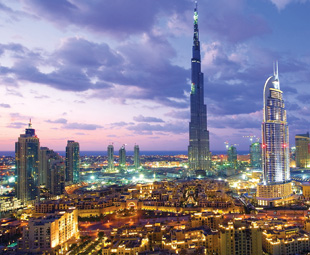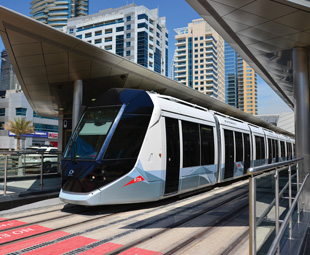Dubai: the gateway to the gulf

We take a look at the Dubai tram system, which seems to be ahead of its time. In other news, residents are considering carpooling after an expected fuel price increase. CLAIRE RENCKEN reports.
Since the start of the new millennium, no other city in the world is said to have achieved as much as Dubai. Its new tram system also seems to be second to none. Launched in November 2014, it has some unique characteristics that make it highly competitive with other tram systems, which have been around for much longer in advanced cities of the world, says its operator, the Roads and Transport Authority (RTA).
Even at first glance, the network, which covers mainly the Al Sufouh, Dubai Marina and Jumeirah Beach Residence areas, is clearly different: there are no overhead suspended electrical wires that characterise tram systems worldwide. In fact, its power is “ground-fed”; sourced from the very tracks on which it runs.
It is also the world’s only network that has stations with gates that open and close automatically, raising the safety standard and convenience to users.
In Dubai no other tram system would have been practical – Dubai Tram is designed to operate in the blistering climate which has temperatures of up to 50°C, the RTA says. Little wonder, then, that its stations and footbridges are fully air-conditioned, which is also a world first.
Many commuters are not aware that, behind the scenes, there are some clever measures built into the system to keep the journey as safe as possible. For example, every tram driver has to take an alcohol test that detects even the smallest traces of alcohol. The driver is only allowed control of the tram once the test is passed.
 There is also the “dead man’s switch” on the lever that the driver has to press every three to five seconds, ensuring that the tram driver is paying attention. If the driver loses control or forgets to press the button, the tram will automatically come to a complete halt immediately.
There is also the “dead man’s switch” on the lever that the driver has to press every three to five seconds, ensuring that the tram driver is paying attention. If the driver loses control or forgets to press the button, the tram will automatically come to a complete halt immediately.
And with a series of high-tech communications and control systems – for both users and operators – Dubai Tram is ensuring it stays ahead of its time.
The 10,6-km tramway is served by 11 stations and 11 trams, which are driven by more than 80 certified drivers.
It only costs three United Arab Emirates dirhams (Dh) to hop on board, making Dubai Tram one of the most affordable networks in the world.
Around a million people have already vouched for its popularity, with 943 982 riders using the tram during the first three months of this year alone, the RTA reports.
Relatively speaking, fuel has always been fairly cheap in Dubai, but it seems as though recently, following the government’s decision to deregulate fuel prices, residents in the country are saying that carpooling may be the way to go.
According to gulfnews.com, starting on August 1, petrol prices were expected to increase after a new pricing policy, linked to global prices, was adopted. One of the objectives of this decision is to lower fuel consumption by encouraging residents to take alternative public transport to protect the environment.
Apart from different modes of public transport, some residents say carpooling is an easier and more direct alternative. Frank Gomez, who works in Media City and lives in Rashidiya, is one of these: “I used to carpool when I lived in International City. I used to take three friends with me and each would pay me Dh200 per month. I would use that money to pay for the petrol, which cost me around Dh150 per week,” says Gomez.
He adds that he prefers carpooling over public transport because taking a bus and then a Metro that stops at a number of locations before reaching his workplace is time-consuming.
Construction inspector John Galindo, 36, also said he is most likely going to try to find a friend to carpool with. “I pay Dh100 per day on petrol because I travel around 200 km daily from Sharjah to my construction site in Abu Dhabi. I was unpleasantly surprised by the decision to deregulate the fuel prices. I already pay around Dh2 500 a month just for fuel,” says Galindo.
When asked why he won’t use other modes of public transport, he says: “In my area it is difficult. Only two buses travel from my area to Abu Dhabi and their times are not convenient,” he says.
Another commuter already travels from Al Karama to her work in Jebel Ali using a carpooling service. “I don’t take public transport because carpooling is more convenient for me. It takes me directly to my workplace entrance, while the Metro does not,” she said.
Jordanian Mais Kanaan, 23, on the other hand said she would not carpool with just anyone, because for her it is not culturally acceptable. “It is just weird to go in a car with a stranger. It is a bit more acceptable if it is a friend. Even then it is not very common in my culture, because then the perception is that you are stingy,” she said.
The RTA requires all individuals involved in carpooling to register online or by using the Sharekni app, which was introduced this year to make the registration process easier.
These might be useful bits of information to bear in mind if you’re planning on visiting, or perhaps even emigrating to, Dubai – or “Do-Buy” as the city known for luxury shopping, among other things, has been nicknamed by some.
Published by
Focus on Transport
focusmagsa




